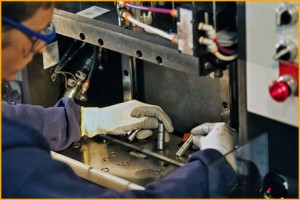The Community College System of New Hampshire (CCSNH) has been awarded $19.9 million, the largest grant in the System’s history, to develop training programs that will support NH’s advanced manufacturing industry.
 The funds will enable the state’s seven community colleges, located in every region of New Hampshire, to develop programs that prepare individuals for skilled employment to meet current and emerging workforce needs in advanced manufacturing in New Hampshire. The programs will focus on displaced workers and other job-seekers by providing training opportunities at multiple professional levels in skills linked to regional employment.
The funds will enable the state’s seven community colleges, located in every region of New Hampshire, to develop programs that prepare individuals for skilled employment to meet current and emerging workforce needs in advanced manufacturing in New Hampshire. The programs will focus on displaced workers and other job-seekers by providing training opportunities at multiple professional levels in skills linked to regional employment.
The CCSNH grant proposal was titled the Regional Advanced Manufacturing Partnership: Elevating NH’s Workforce to Meet the High-Tech Skill Demands Of NH’s Rapidly Advancing Manufacturing Sector, or “Ramp-Up.” “This program is all about bringing high-quality jobs to New Hampshire, ensuring that we have the workforce to fill those jobs, enable business located here to grow, attract new companies, and increase economic activity,” said J. Bonnie Newman, Chancellor of the Community College System.
“Manufacturing is a critical driver of economic growth and employment in our state,” said U.S. Senator Jeanne Shaheen. “However, as businesses replace traditional manufacturing methods with advanced technology, many job-seekers have been unable to keep up because they lack the specialized skills required. By arming workers with the tools needed to excel in advanced manufacturing, this award will help New Hampshire workers secure high-paying jobs and help New Hampshire companies hire high-quality employees.”
“With manufacturing as such an important part of New Hampshire’s economy, a key part of our successful economic strategy has been training our workers in advanced skills so they can keep up with changing technology, and our businesses can continue to compete globally. This grant is exciting news for our state, our workers and our businesses. This is a tremendous amount of funding that will allow us to expand our worker training efforts, which will help more companies grow and compete,” Gov. Lynch said. “This is great news for New Hampshire’s economy.”
CCSNH’s efforts will target advanced manufacturing sub-sectors inculding automation and robotics, precision manufacturing, advanced machine tool technology, mechatronics, advanced materials technologies and composites, precision welding, automation and process control, and energy systems for precision manufacturing.
“This funding comes at a very important time, since students and the college population in New Hampshire have been disadvantaged by state budget cuts and decreased access to education and training opportunities,” said Newman. “While this grant will not replace state funds that were cut, it will make possible focused efforts in partnership with NH businesses to create educational and career ladders for advanced manufacturing jobs, a key industry here in New Hampshire and in the nation.”
“New Hampshire’s community colleges are uniquely situated to provide these opportunities and work in partnership with employers,” Newman said. “We have campuses in every region of the state. NH companies already look to the community colleges to train a local workforce in high-need skills like health care and technology. The community colleges are adept at providing access to students of all ages, backgrounds, and aspirations, and we have already developed strong partnerships that enable students to continue their education to the baccalaureate level and beyond.”
The CCSNH proposal was developed in close collaboration with over a dozen NH manufacturing companies from across the state. The industry partners provided data on current and future workforce needs, skills gaps of the current workforce and job applicant pool, industry trends, and specific equipment and types of training key to their ability to thrive and compete globally. Other partners in the application included the Business and Industry Association of New Hampshire, the NH High Tech Council, the Advanced Manufacturing Education Advisory Council, the NH Department of Resources and Economic Development, the NH Department of Labor, NH Employment Security, and the NH Department of Education.
Jim Roche, president of the Business and Industry Association of NH, said, “If we expect to retain and grow companies in New Hampshire’s leading economic sector – advanced manufacturing – we need to ensure alignment between training provided through our educational institutions and the needs of manufacturers and high technology employers. This grant represents a great opportunity to further that goal.”
George Bald, Commissioner of the NH Department of Resources and Economic Development, said, “This grant will have a tremendous impact on the NH workforce, on the quality of jobs that come to the state, and on the strength of the manufacturing industry in New Hampshire. The close collaboration between the community colleges and our NH employers to identify skill areas and training needs reflects the excellent working relationship that exists in New Hampshire to strengthen our workforce.”
CCSNH applied for the grant through the U.S. Department of Labor’s Trade Adjustment Act-Community College Career and Training Grant program.










 “As important as other sectors are, there is no question that the smart manufacturing/high technology sector drives New Hampshire’s economy and is absolutely critical to the state’s long-term economic prosperity,” said BIA President Jim Roche. “SMHT companies generate more wealth for New Hampshire, pay more in compensation to employees, export more and pay more in state taxes than any other sector.”
“As important as other sectors are, there is no question that the smart manufacturing/high technology sector drives New Hampshire’s economy and is absolutely critical to the state’s long-term economic prosperity,” said BIA President Jim Roche. “SMHT companies generate more wealth for New Hampshire, pay more in compensation to employees, export more and pay more in state taxes than any other sector.”